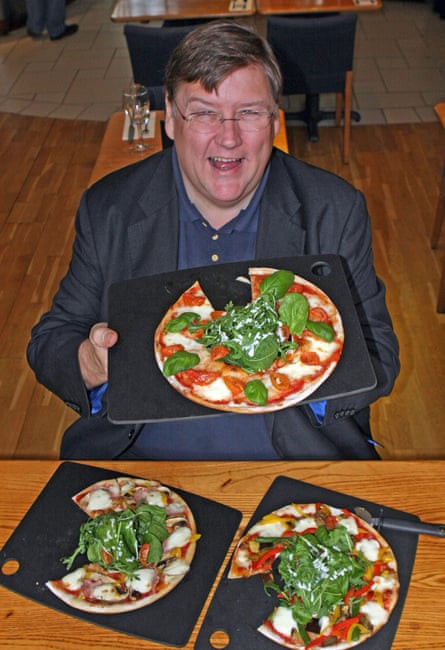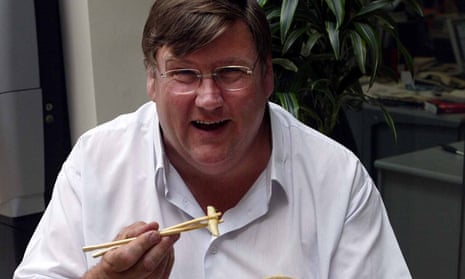Charles Campion, who has died aged 69, from complications of heart disease, was a big man in every sense of the word – big in stature, girth and appetite, but bigger in heart and mind. He looked what he was – an authority on food, not simply about the food on the plate, but everything that lay behind it and beyond it, the produce, the way ingredients were produced, the politics and social history. He was omnivorously curious and inquiring.
Charles began writing for the London Evening Standard in 1992, in the era of the colossus restaurant critic. Jonathan Meades, AA Gill and Fay Maschler were the arbiters of public gastronomic taste. Charles spotted that these eminent figures tended to specialise in high-end, and mostly European, establishments, at a time when there was an explosion of minority ethnic restaurants all over the country, and in London in particular. So Charles turned his attention to the lesser known, less fancy Thai, Chinese, Indian, Korean, often small, family-run places.
He would arrive in London in his battered Volvo from his home in Worcestershire for a few days’ reconnaissance during which he would pad his way from curry house to kebab palace, from Thai stall to pie shop, from Japanese kaiten conveyor belt to Chinese dim sum, from dives specialising in Korean bulgogi to burger-boasting diners, frequently on the same day.
Aside from his column in the Standard, much of his research found its way into the annual Tio Pepe restaurant guide that he wrote for a number of years. This was an invaluable resource for other food writers without Charles’s remarkable stamina, in part because you knew that he had personally vetted every establishment listed, but also because, uniquely, the guide was crafted by a single – and singular – mind.
The fact that he lived in Worcester rather than London gave him a different perspective on what was important in the restaurant world, that not everyone wanted to dine in high-end restaurants with a high-profile chef every day. Charles did as much as any food writer to democratise eating out in the UK and to enlarge understanding of culinary diversity. Gastronomic snobbery played no part in his scheme of things, although he was a stickler for things being done properly.
Charles was born in Leamington Spa. His father, Geoffrey Campion, a convivial man, was an international salesman. His mother, Meriel (nee Swann), had worked as a mechanic during the second world war, but concentrated on the home and her great love, cooking, after it. It was a love that she passed on to her son.

Photograph: Alex Lentati/Evening Standard/Rex/Shutterstock
After being educated at Blundell’s school in Devon and Watford Art College in Hertfordshire, Charles was due to go to Cambridge, but was lured into advertising as a copywriter at Masius Wynne-Williams after filling in during his gap year. In view of his later calling, it is ironic that he worked on the campaign that helped launch McDonald’s in the UK. On the other hand, in those days of big budgets and a rather hedonistic approach to the creative process, advertising was a useful profession in which to train your tastebuds.
He married Sylvia Murray in 1986 and in 1988 he quit the ad world to follow his true love, cooking. He and Sylvia bought a small hotel, Cold Springs House in Buxton, Derbyshire. As he himself was wont to point out ruefully, they could hardly have got their timing worse. The hotel closed in 1991, a victim of a sharp recession and penal interest rates. By this time he had a daughter, Ashley, and a son, Geoffrey, to support as well. Hospitality’s loss proved Fleet Street’s gain.
Although he carved out a unique niche at the Evening Standard by his experience, understanding and judgment of minority ethnic restaurants, Charles had an unquenchable passion for British food and food producers, something that he promoted throughout his life. He put in frequent appearances on television in Greatest Dishes in the World, MasterChef and Eating With the Enemy, as well as writing cookery books, including The Livebait Cookbook (1998), Real Greek Food (2004), Fifty Recipes to Stake Your Life On (2004), Food From Fire (2006) and Eat Up! (2010), that bore testament to his catholic taste and understanding of what made a recipe you wanted to cook.
There was the public Charles, substantial in manner and matter, gruffness hiding natural shyness, occasionally a bit Eeyorish, but always open-minded and open-mouthed when it came to food. And there was the private Charles, generous to his friends, drily funny, a kind and overwhelmingly hospitable host; a parent with transparent pride in his children, no matter how mad they drove him from time to time; a devoted husband who knew how much he depended on Sylvia to hold the household together while he carried on his research in London and elsewhere; a stalwart beer drinker, a keen fisherman, a rugby enthusiast, a devoted supporter of Worcester rugby club at a time when it wasn’t exactly fashionable to be so; widely read.
Although he was named the Glenfiddich food writer of the year in 1997 and in 2018 won the Great Taste award for contribution to fine food, he never received the recognition or reward his tireless research and immense knowledge deserved. This may have been the result in part of the fact that he didn’t suffer fools gladly, and made it quite clear when he thought you were being a fool. He was also an outsider. He lived outside London, and while a constant presence on the London restaurant scene, he was never committed to the metropolitan foodie carousel. He was one of the few restaurant critics who had actually worked in the hospitality industry before he ever put critical pen to paper, and his experiences at the sharp end gave his writing insight, weight and, above all, sympathy for the people he was writing about.
Charles is survived by Sylvia, Ashley and Geoffrey.

Comments (…)
Sign in or create your Guardian account to join the discussion